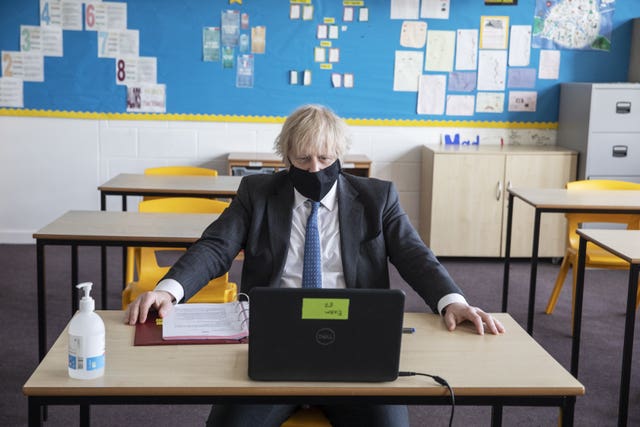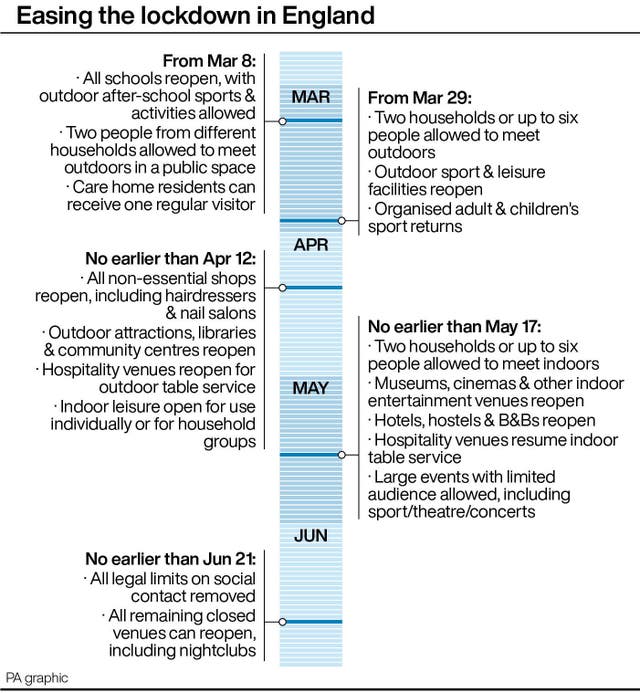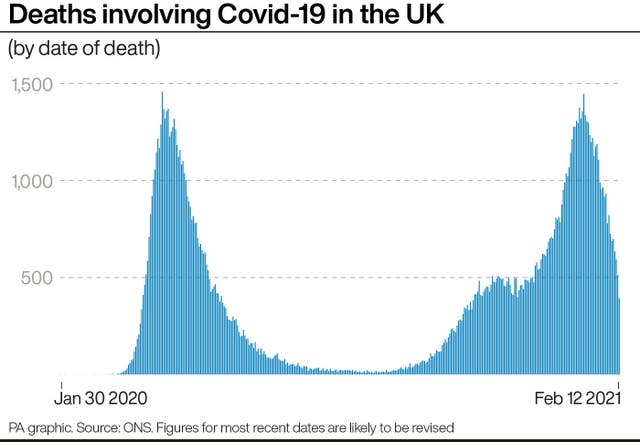Johnson ‘very optimistic’ all lockdown restrictions will be removed on June 21
The PM also announced that Michael Gove will lead a review into the possible use of vaccine passports.

Boris Johnson has said he is “very optimistic” that he will be able to fully remove all of England’s coronavirus restrictions on June 21 but warned “nothing can be guaranteed”.
The Prime Minister urged the nation to be “prudent” by continuing to follow the rules after publishing his road map to gradually lift the third national lockdown over the coming months.
Facing criticism from some Tory MPs over the pace of change, Mr Johnson said he was “hopeful” that all legal controls can be removed on the final date earmarked in his four-step plan.
Mr Johnson also announced that senior minister Michael Gove will lead a review into the possible use of vaccine passports to access currently closed venues, such as pubs and theatres.
And he said Chancellor Rishi Sunak’s Budget next week will be a “Budget for jobs and to protect people throughout the pandemic and beyond”, amid calls to extend the financial packages.
Having insisted that he will be led by “data not dates”, the Prime Minister expressed optimism that relaxations will be complete by June 21, as tentatively scheduled in his road map, when nightclubs could reopen and large-scale events resume.
“I’m hopeful but obviously nothing can be guaranteed and it all depends on the way we continue to be prudent and continue to follow the guidance in each stage,” he told reporters during a visit to Sedgehill Academy, in Lewisham, south-east London.
“Genuinely, because of the immense possibilities of the rollout, because science has given us this way of creating a shield around our population, we can really look at that June 21 date with some optimism.
“I’m very optimistic that we’ll be able to get there.”

Mr Johnson acknowledged that “fervent libertarians” will reject the premise of vaccine passports or “Covid status certificates”, as he calls them, but said they need to be investigated.
He argued “we can’t be discriminatory against people” who cannot have a jab for medical reasons, while acknowledging some may also “generally refuse to have one”, albeit on mistaken grounds.
As the vaccine programme continues to progress, the Prime Minister said Mr Gove, the Chancellor of the Duchy of Lancaster, will lead a review to get “the best scientific, moral, philosophical, ethical viewpoints on it and work out a way forward”.
Meanwhile, Health Secretary Matt Hancock issued a renewed appeal for people to get jabs amid warnings that the virus may persist in deprived inner city communities where uptake is low.
The chairman of the Covid Recovery Group of lockdown-sceptical Tory MPs, Mark Harper, said the country should not be “held back” by those who refuse it, with uptake of more than 90% among the groups that have been offered the vaccine.
However, Dr Mike Tildesley, a member of Government advisory group SPI-M, warned that failure to ensure all communities are protected could lead to a new wave of infections.
“We know there are certain areas, in particularly inner city areas, deprived areas, where vaccine uptake is not as high,” he told BBC Radio 4’s Today programme.
“And that actually poses a real risk that we are not capturing currently in those models – if we do get these pockets of infection then it could be that actually we could have a more significant risk.
“So actually it’s really important that we get the vaccines out to those deprived communities to prevent a potential wave of infections occurring as we do unlock.”

Mr Hancock said the Government is working “incredibly hard” to ensure as many people as possible receive the vaccine.
“We want to see that vaccine uptake go as high as possible. But it’s absolutely on all of us to come forward and get the vaccine. It’s the right thing to do,” he told the Today programme.
England’s schedule for easing restrictions was followed on Tuesday afternoon by First Minister Nicola Sturgeon detailing her own plan for easing Scotland’s lockdown.
She said the stay-at-home order is expected to be lifted from April 5, with a phased reopening of the economy hoped to start on April 26 and to be separated by at least three weeks.
Ms Sturgeon said she hopes to be able to give more detail in mid-March on the easing of restrictions.
In the first step of England’s road map, all pupils are expected to return to class from March 8, with wider use of face masks and testing in secondaries.

Socialising in parks and public spaces with one other person will also be permitted from that date.
A further easing will take place on March 29, when the school Easter holidays begin, with larger groups of up to six people or two households allowed to gather in parks and gardens.
But progressing along the schedule will depend on meeting four tests: the success of the vaccine rollout, evidence of vaccine efficacy, an assessment of new variants, and keeping infection rates below a level that could put unsustainable pressure on the NHS.
In Scotland and Wales the phased return of children to classes began on Monday, with Welsh First Minister Mark Drakeford suggesting stay-at-home orders could be eased in around three weeks.
In Northern Ireland, First Minister Arlene Foster has promised a “decision-making framework” on how the executive plans to exit lockdown will be published on March 1.





